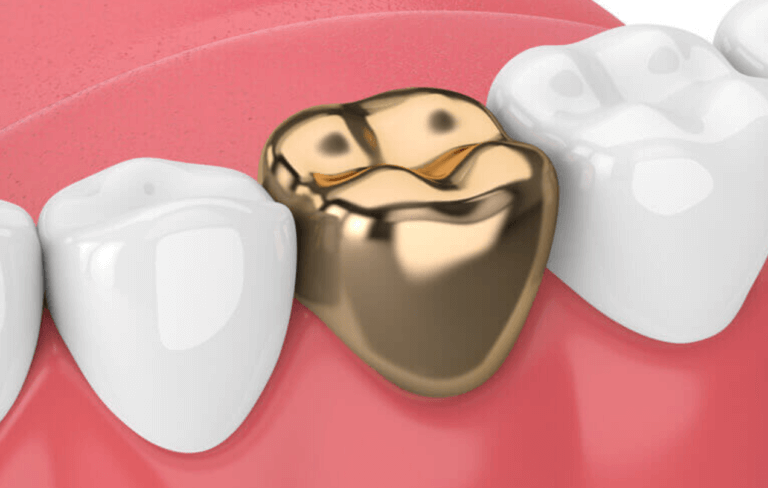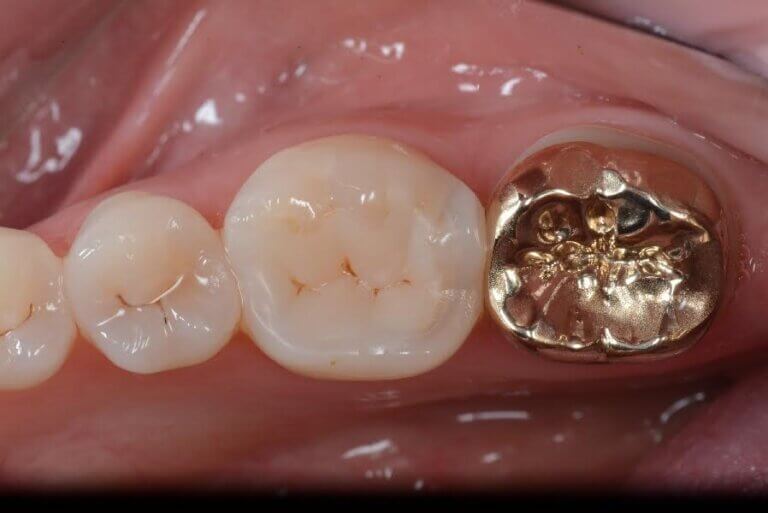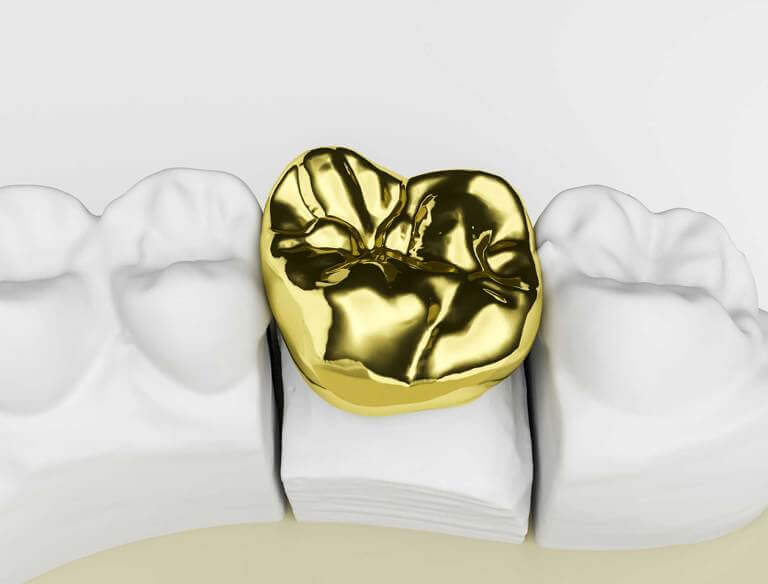Gold Dental Crown

What Is A Gold Crown?
A Gold Crown is a type of dental restoration made primarily from a gold alloy, custom-designed to cover and protect a damaged tooth. Gold crowns are typically crafted from 10 to 20 karat gold, blending pure gold with other metals like silver, copper, and palladium to enhance durability. This blend of metals provides biocompatibility, resistance to corrosion, and long-lasting strength, making gold crowns ideal for certain dental situations.
Before you deciding on whether A Gold Crown is right for you, there are some things you should know:
- Who Needs A Gold Crown?
- Benefits of Gold Crowns
- Alternatives to Gold Crowns
- How Much Does A Gold Crown Cost?
- Steps In The Gold Crown Procedure
- Frequently Asked Questions About A Gold Crowns
If you have any further questions about A Gold Crown or other dental services offered at Atlas Dental, please contact us.

Free phone consultation
Have a question about Dental Crowns? Schedule a free phone consultation with our cosmetic dentist.

5 star google reviews
Our patients love us! See for yourself why patients are choosing Atlas Dental for their Dental Crowns.

Book Emergency Crown Visit online
Have a chipped or broken tooth and need a dental crown? Book online for emergency dental crown treatment.
Who Needs A Gold Crown?
A gold crown may be recommended for individuals with:
- Damaged or Decayed Teeth: Ideal for restoring teeth that have significant decay or structural damage, providing added strength and stability.
- Fractured or Cracked Teeth: Gold crowns support fractured teeth, reducing the risk of further damage.
- Teeth with Large Fillings: For teeth with substantial fillings, a gold crown can offer reinforcement and protection against future breakage.
- Severely Worn Teeth: If grinding or other habits have worn down teeth, a gold crown can restore both appearance and function.
- Root Canal Treated Teeth: Root-canal-treated teeth benefit from the additional support a gold crown provides, protecting the tooth from potential fractures.
- Cosmetic Reasons: Some people choose gold crowns for a unique aesthetic or to make a personal statement, as gold has a distinct look compared to other materials.
It’s important to note that the suitability of a gold crown depends on various factors, including the specific dental condition, the patient’s preferences, and the recommendations of the dentist. If you have further questions about whether a gold crown is right for you, please contact us.

Benefits of Gold Crowns
Gold crowns offer several key benefits:
- Durability: Gold is one of the most durable dental materials, withstanding the forces of chewing and lasting significantly longer than other crown materials.
- Biocompatibility: Gold crowns rarely cause allergic reactions and are well-tolerated by the body, making them an excellent choice for those with sensitivities.
- Minimal Tooth Reduction: Gold crowns require less tooth reduction, preserving more of the natural tooth structure.
- Longevity: With proper care, gold crowns can last 10–15 years or longer, making them a cost-effective solution over time.
These advantages make gold crowns particularly suitable for molars and other teeth exposed to heavy chewing forces. If you have further questions about the pros and cons of a gold crown, please contact us.
Alternatives to Gold Crowns
While gold crowns are durable and biocompatible, there are several alternatives:
- Zirconia Crowns: Strong and highly aesthetic, zirconia crowns are an all-ceramic option that mimics natural teeth, ideal for those seeking a metal-free option.
- Porcelain-Fused-to-Metal (PFM) Crowns: These crowns combine a metal base with a porcelain overlay for durability and a more natural look. However, the metal may show as a grey line at the gum line.
- All-Ceramic (Lithium Disilicate) Crowns: These crowns offer high esthetics, making them suitable for visible teeth. They’re not as durable as gold crowns but are an excellent option for patients with metal allergies.
Your dentist can help you choose the best material based on your oral health, aesthetic preferences, and budget. If you have further questions about the dental crown options, please contact us.
Cost of Dental Crown
The cost of a Dental Crown ranges between $1349-1449. The codes relevant to dental crowns in the Ontario Dental Association’s Suggested Fee Guide appear as follows:
Crowns, Porcelain/Ceramic/Polymer Glass
- 27201 – Crown, Porcelain/Ceramic/Polymer Glass: $1099 + Dental Lab Fee ($250-350)
Some crowns are more expensive than others. The three most common dental crown types listed in order from least expensive to most expensive are:
- All Ceramic crowns including Zirconia crowns and Lithium disilicate crowns
- Porcelain fused to metal crowns
- Full metal crowns, including gold crowns
Dental crowns are considered a major restorative service under all dental insurance plans and may or may not be covered by your dental insurance. Be sure to find out from your dental insurance plan provider how much you are eligible for before going ahead with dental treatment. Your dentist can help you submit an predetermination to your dental insurance.
For patients without dental insurance, Atlas Dental is pleased to offer dental financing through iFinance Dentalcard. Affordable payment plans start at 7.95% for terms of 6 months to 6 years. To learn more about Dentalcard dental treatment financing, follow this link.
Steps in the Gold Crown Procedure
The process of getting a gold crown usually requires two visits:
First Appointment
- Consultation and Examination: Your dentist will examine the tooth, possibly taking x-rays, to ensure it’s suitable for a gold crown.
- Tooth Preparation: The tooth will be shaped by removing a thin layer of enamel to fit the crown.
- Impressions: An impression or digital scan of your teeth will be taken to ensure a precise fit.
- Temporary Crown Placement: A temporary crown protects the tooth until your custom gold crown is ready.
Second Appointment
- Temporary Crown Removal: The temporary crown will be removed, and the tooth will be cleaned.
- Crown Fitting and Adjustment: Your dentist will test the fit and make any adjustments for comfort and bite alignment.
- Crown Bonding: The gold crown will be cemented in place and polished.
The first appointment usually takes 1 hour to accomplish, and the second appointment can take up to 30 minutes. If you have further questions about how we make your gold crown, please contact us.

Frequently Asked Questions About Gold Crowns
- How long does a gold crown last?
With proper care, gold crowns can last between 20 to 40 years, and in some cases, even longer. Their longevity surpasses that of many other crown materials.
- Are there any allergies or sensitivities associated with gold crowns?
Allergic reactions to gold crowns are rare. However, individuals with known metal allergies should discuss this with their dentist to ensure the chosen alloy is appropriate.
- Will my insurance cover the cost of a gold crown?
Insurance coverage for gold crowns varies by provider and plan. Some plans may cover a portion of the cost, while others might only cover less expensive alternatives. It’s advisable to check with your insurance provider for specific details.
- How should I care for my gold crown?
Maintain good oral hygiene by brushing and flossing regularly, and visit your dentist for routine check-ups. Avoid chewing hard substances like ice or hard candies to prevent damage to the crown. Please read our dental crown post-insertion instructions.
Gold dental crowns offer a durable, reliable, and long-lasting solution for restoring damaged teeth, making them a trusted choice for many patients. If you have further questions about the longevity of your gold crown, please contact us.

